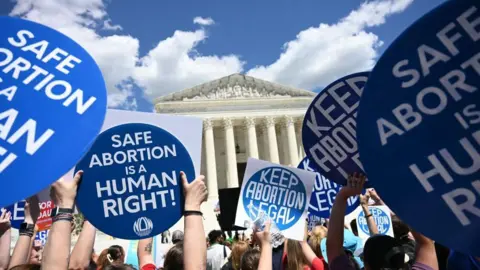This website uses cookies so that we can provide you with the best user experience possible. Cookie information is stored in your browser and performs functions such as recognising you when you return to our website and helping our team to understand which sections of the website you find most interesting and useful.

 Getty Images
Getty ImagesWho should be the next president won't be the only thing on the ballot this November.
Tens of millions of voters in Montana, Arizona, Missouri, Nebraska, Colorado, Florida, Maryland, Nevada, New York and South Dakota will be asked how their state should regulate abortion.
Most of the initiatives in those 10 states would allow abortion until foetal viability, which is generally considered about 24 weeks, or later only in instances when the health of the pregnant woman is at risk.
The efforts are a response to the Supreme Court's 2022 decision to overturn Roe v Wade, which led many states to enact abortion restrictions or bans. Pro-choice advocates hope that by having voters directly decide to enshrine abortion in states' laws, they can bypass the ups and downs of state courts.
But there's another reason why some want abortion on the ballot - voter turnout.
Democrats hope that more people who support abortion rights, who overwhelmingly vote for the party, will show up on election day because the issue is on the ballot.
Here's what each state will ask voters.
Arizona
What's the law now?
Abortions in Arizona are currently legal until the 15th week of pregnancy. After this point, the law makes an exception for the procedure to save a mother's life, but not for rape or incest.
What's on the ballot?
A question on whether to amend the state constitution to protect the right to abortion up to foetal viability, or about the 24th week of pregnancy.
How could this affect the election?
It could bring women to the polls in larger numbers in a year where the election is close in this hotly-contested swing state, said Celinda Lake, a veteran Democratic pollster who worked for the 2020 Biden campaign.
But Katarina White, from Arizona Right to Life, said it presents an opportunity for Republicans to court the state's Latino population, as polls suggest a proportion of those voters oppose abortion on religious grounds, but tend to vote Democrat otherwise.
Nebraska
What's the law now?
Abortion is illegal after the 12th week of pregnancy in Nebraska except in cases of rape, incest and when the life of the mother is threatened.
What's on the ballot?
Nebraska is the only state that will have two competing ballot initiatives this November.
The first one would enshrine the right to an abortion in the state constitution until foetal viability or later to protect the health of the mother. The second one would enshrine the current 12-week abortion ban into the state's constitution with some exceptions including incest, rape and to save the life of the pregnant woman.
How could this affect the election?
The competing ballot initiatives could boost turnout in the state, but it is unlikely to change the outcome of other races. Nebraska also has a paid family leave initiative on the ballot, and Ms Lake said both questions could bring more voters out to the polls.
Nevada
What's the law now?
Abortion is legal until the 24th week of pregnancy in Nevada, but only if the physician treating the patient believes abortion is necessary to protect the mother's life.
What's on the ballot?
A question on whether to enshrine access to abortion in the state's constitution. In order for the protection to be added to the constitution, the ballot question will need to be approved by voters twice: once in 2024 and once in 2026.
How could this affect the election?
Nevada is one of the most hotly-contested swing states in the election. If more Nevadans show up to the polls and are motivated to vote on this question, it could prove helpful for Democrats.
Florida
What's the law now?
Abortion is currently illegal after six weeks of pregnancy, except in some cases. If an individual wants to have an abortion before the six week mark Florida requires two in-person visits to a clinic, 24 hours apart.
There are some exceptions to these regulations, including rape, incest and human trafficking but those only apply up until 15 weeks of pregnancy.
Abortions in Florida can also be provided after six weeks if a woman's life is at stake, she faces "substantial and irreversible" physical impairment or if there is a fatal foetal abnormality.
What's on the ballot?
Voters will vote to add language to the state constitution that would protect abortion access that says: "No law shall prohibit, penalise, delay, or restrict abortion before viability or when necessary to protect the patient’s health, as determined by the patient’s healthcare provider."
How could this affect the election?
The issue is unlikely to affect national or local races - but it did put a spotlight on Donald Trump and his stance on abortion.
The former president, who lives in Florida, initially said he would vote in favour of the initiative, but after receiving pushback from within his own party he said he would vote against it.
Maryland
What's the law now?
Abortion is legal in Maryland.
What's on the ballot?
A question that would enshrine the right to an abortion and "reproductive freedom" in the state's constitution.
How could this affect the election?
The state is proposing to protect abortion at the state level, in case anything changes at the federal level, Maryland Senate President Bill Ferguson, a Democrat, said after the legislature made its proposal.
"This gives residents of this state an opportunity to send a clear signal that access to safe abortions will be enshrined," he said.
In theory, this initiative this could impact a tight Senate race where the candidates have been frequently asked about abortion.
New York
What's the law now?
Abortions are legal in New York, but after the 24th week of pregnancy women must get a doctor's approval to have an abortion.
What's on the ballot?
A different question than in other states. Here, the initiative is to amend the state's equal rights amendment to include protections against discrimination due to pregnancy, pregnancy outcomes and reproductive healthcare.
The word "abortion", however, is not included in the ballot question.
How could this affect the November election?
There are a handful of razor-tight House races in the state in which Democrats could be helped if voter turnout is high because of this ballot question. And control of the House of Representatives could come down to just a few seats.

More on US election

Missouri
What's the law now?
Abortion is prohibited in Missouri "except in cases of medical emergency".
The law currently states it is illegal to perform or induce an abortion, and if someone does it is punishable by five to 15 years in prison.
What's on the ballot?
A question that would enshrine the right to abortion in Missouri until foetal viability in the state's constitution, which would reverse the current ban.
How could this impact the election?
For the consistently Republican state, it is unlikely the ballot question will change the outcome of any other Missouri races.
But its effects go further than just who wins this election, said Mallory Schwarz, executive director at Abortion Action Missouri. Reversing the ban would bring abortion back into the state, potentially making Missouri a destination for women in nearby southern and Midwestern states where the procedure is banned or heavily restricted.
Montana
What's the law now?
Abortion is legal until foetal viability in Montana.
What's on the ballot?
A question that would explicitly create a constitutional right to abortion.
How could this affect the election?
There is a hotly contested Senate race coming up in the state that could decide which party controls the US Senate.
Having the question on the ballot, as in other states with similar questions, could drive turnout especially among women. "The key to winning Montana is winning women by more than you lose men," Ms Lake, the veteran Democratic pollster, said.
Colorado
What's the law now?
Abortion is legal at all stages in pregnancy.
What's on the ballot?
A question that would enshrine a right to abortion in the state constitution and allow the use of public funds for abortion.
How could this impact the election?
The question is unlikely to impact the election in November as polls indicate people here largely support access to abortion.
Four years ago, voters rejected a measure that would have banned abortions after 22 weeks.
South Dakota
What's the law now?
All abortions are currently prohibited except when necessary to save the life of the mother.
What's on the ballot?
A question that would establish a constitutional right to abortion and would prevent the state from regulating "a pregnant woman's abortion decision and its effectuation" in the first trimester.
It would allow second-trimester regulations "only in ways that are reasonably related to the physical health of the pregnant woman".
How could this affect the election?
This is unlikely to given the state leans Republican.



 Africana55 Radio
Africana55 Radio 

